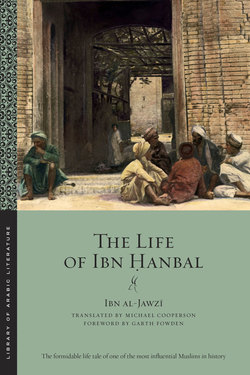Читать книгу The Life of Ibn Ḥanbal - Ibn al-Jawzi - Страница 32
На сайте Литреса книга снята с продажи.
ОглавлениеCHAPTER 18
ALLIES OF GOD WHO VISITED HIM TO SEEK HIS BLESSING
[Ṣāliḥ:] One day I came home and heard that my father had sent for me the day before. When I found him, he said, “There was someone here yesterday I wanted you to meet. It was around noon; I was sitting here and I heard a man at the door. Somehow I felt drawn to him. I got up and opened the door. Standing there was a sunburned man wearing a cloak of fur and a ragged piece of cloth on his head. He had no shirt on under the cloak, and he wasn’t carrying a leather water bottle or a staff. I invited him in and he came into the anteroom. 18.1
“‘Where are you coming from?’ I asked.
“‘From the east,’ he said, ‘and I’m heading for the coast. If not for you, I wouldn’t have come into the city, but I wanted to pay my respects.’
“‘Do you travel dressed like that?’
“‘I do.’ Then he asked me: ‘What do you understand by renunciation of the world?’
“‘Not taking anything for granted,’ I answered, surprised.
“Then I thought to myself, ‘I have no silver or gold to give him.’ So I went into the house, found four loaves of bread, and brought them out.
“‘I have no silver or gold,’ I told him, ‘but this is what I eat.’
“‘Would it make you happy if I took them?’
“‘Yes,’ I said. So he took them and put them under his arm and said, ‘I think now I’ll have enough food to get me TO al-Raqqah. Good-bye!’
“I couldn’t stop staring at him until he left the house.”
Afterward my father spoke of him often.
[Ibn Sāfirī:] When we were young, we used to pray and practice austerities at the Perfumer’s Mosque. Some of us would weave palm fibers, others would make spindles, and so on. One member of the group was a strapping young man who told us this story. “We used to fish around Dujayl,” he said. “One day, as it was getting dark, a man dressed in rags walked by. I ran after him but couldn’t catch him. So I called him over. 18.2
“‘Hey you!’ I said. ‘Are you one of the Substitutes?’108
“‘Yes.’
“‘Where are you going?’
“‘Syria.’
“‘Where are you coming from?’
“‘Aḥmad ibn Ḥanbal’s.’
“‘What were you doing there?’
“‘Asking him a question,’ he said. ‘Aḥmad is one of us, but he knows more than any of us.’
“It was time to pray the sunset prayer, so we did, and then prayed the evening prayer. When he finished, I said, ‘Have some of this fish; we catch it ourselves.’109
“‘We don’t eat,’ he replied, and then vanished as if the earth had swallowed him up.”
[Al-Marrūdhī:] One day a renunciant approached us, and I took him in to see Aḥmad. He was wearing a ragged cloak of fur and a scrap of cloth on his head, and wore no shoes despite the bitter cold. Ibn Ḥanbal greeted him and he replied, “I’ve come a long way, but all I want to do is pay my respects. I’m heading for ʿAbbādān, and if I return from there, I’d like to come and see you again.” 18.3
“If you return, then,” said Ibn Ḥanbal.
The man rose and said good-bye to Aḥmad who was sitting down.
It was the only time I ever saw anyone get up and leave before Aḥmad had stood up.
“He looks like one of the Substitutes, doesn’t he?” said Aḥmad; or perhaps, “He makes me think of the Substitutes.”
Then he brought some food—four loaves split and filled with fermented grain paste110—out to him. “If I had anything more to give you,” he said, “I would.”
[Ismāʿīl al-Daylamī:] I was at Aḥmad ibn Ḥanbal’s when someone knocked on the door. I went out to see who it was and found a young man wearing a ragged hair shirt. 18.4
“What do you want?” I asked.
“I want Aḥmad ibn Ḥanbal,” he said.
When I told Aḥmad that there was a young man in a ragged hair shirt asking for him, he went out and greeted him.
“Aḥmad,” the man said, “tell me what renunciation of the world means.”
“I heard Sufyān report, citing al-Zuhrī, that renunciation of the world means not taking anything for granted.”
“Tell me more,” said the young man, who was standing in the sun even though there was a patch of shade directly in front of him.
“It means never being sure that if you leave the sun you’ll live long enough to reach the shade.”
The man turned to leave, but Aḥmad said, “Wait!” He went into the house and came back holding out a little bundle.
“I don’t count on living long enough to reach the shade,” said the man. “What would I need that for?”
Then he turned and walked away.
[Aḥmad:] Early one morning I went out and came across a man with a cloth over his face. He handed me a slip of paper. When the light had grown strong enough to see by, I took it out and read what was written on it: 18.5
For each delight, the world brings a grief
To the pauper’s hut and the rich man’s gate;
While those who study
Seek not to learn,
But to vaunt, and vex their peers with vain debate.111
I thought it must have been Muḥammad ibn Yaḥyā l-Dhuhlī who had handed me the paper. Later, though, I found Muḥammad and asked him about it, and he said, “I never saw you and I never gave you a piece of paper.”
It was then that I realized that the poem had been an admonition.
